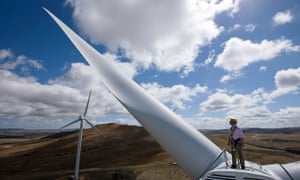Extract from The Guardian
Clean Energy Council says $600m was invested in large-scale renewable projects in the second quarter, a drop of almost half from the first quarter
Investment in large-scale renewable energy projects in Australia has slumped to its lowest level since 2017 due to uncertainty over federal policy and delays in grid connection, according to an industry body.
The Clean Energy Council said $600m was invested in large-scale renewable projects in the second quarter this year, a drop of almost half from the previous quarter. Only three major projects reached financial close in the quarter and it had now been a year since a large-scale energy storage project had been commissioned.
One major windfarm developer, Tilt Renewables, told shareholders on Wednesday that “urgent reform” was needed to better manage the transition to clean energy.
The Clean Energy Council chief executive, Kane Thornton, told Guardian Australia investments in the electricity transmission network had not kept pace with the rapid deployment of wind and solar farms.
He said underinvestment in the energy network was creating congestion and causing delays in projects being connected. The council was talking to the Australian Energy Market Operator (Aemo) about addressing the problem.
“Investors don’t have a clear view on what the federal government’s long-term strategy and policies are – that’s challenging,” Thornton said.
He said the council asked clean energy CEOs to name the biggest barriers to the industry developing large-scale projects. The coronavirus did not rate in the top five.
“The industry here has been relatively un-impacted by Covid-19,” he said. “We have seen record levels of uptake in rooftop solar.”
Thornton said suggestions by government advisers that gas infrastructure would be favoured over renewable energy in the economic recovery from the pandemic had created further uncertainty.
“That’s not what was anticipated in the electricity market. Will we now see a wave of governments investing in gas projects? What does that mean for other commercial projects?”
Investment in large-scale renewable energy has fallen since since the national renewable energy target of 23% of electricity coming from clean energy sources was reached last year. A planned new national energy policy, the national energy guarantee, was abandoned when Scott Morrison replaced Malcolm Turnbull as prime minister.
A recent Aemo plan for what an optimal national electricity market would look like to 2040 found renewable energy could at times provide nearly 90% of electricity by 2035 and that there would need to be major investment in new transmission lines, with the cost of these connection projects having increased by 30%.
A June report from financial consultants Ernst & Young, commissioned by environment group WWF-Australia, suggested economic stimulus programs that focused on clean energy would create three times as many jobs as fossil fuel projects.
A separate analysis from the University of Sydney found up to 11,000 jobs could disappear from Australia’s renewable energy industry in the next two years under current government policies.
Labor’s climate change and energy spokesman, Mark Butler, said the collapse in investment in large-scale renewables was “a direct result of the Morrison Government’s chaotic and continuing energy policy failure”.
He said: “After seven years and 19 energy policy attempts, this government has no national energy policy and they continue an anti-renewables agenda, refusing to capitalise on the huge benefits that renewable energy can bring to Australian households and businesses.”
Tilt Renewables finished construction of the $560m Dundonnell windfarm in Victoria’s west in July, including installation of Australia’s largest wind turbines – 80 towers with rotors 150 metres long.
The company’s chief executive, Deion Campbell, told an annual general meeting on Wednesday the windfarm had not been able to connect fully to the power grid because of “unexpected” new Aemo requirements.
He told shareholders urgent reforms were needed in Australia as the country managed the transition to a decentralised energy system as developers were “almost universally having significant challenges commissioning new renewables”.
Guardian Australia approached the office of the energy and emissions reduction minister, Angus Taylor, for comment.

No comments:
Post a Comment